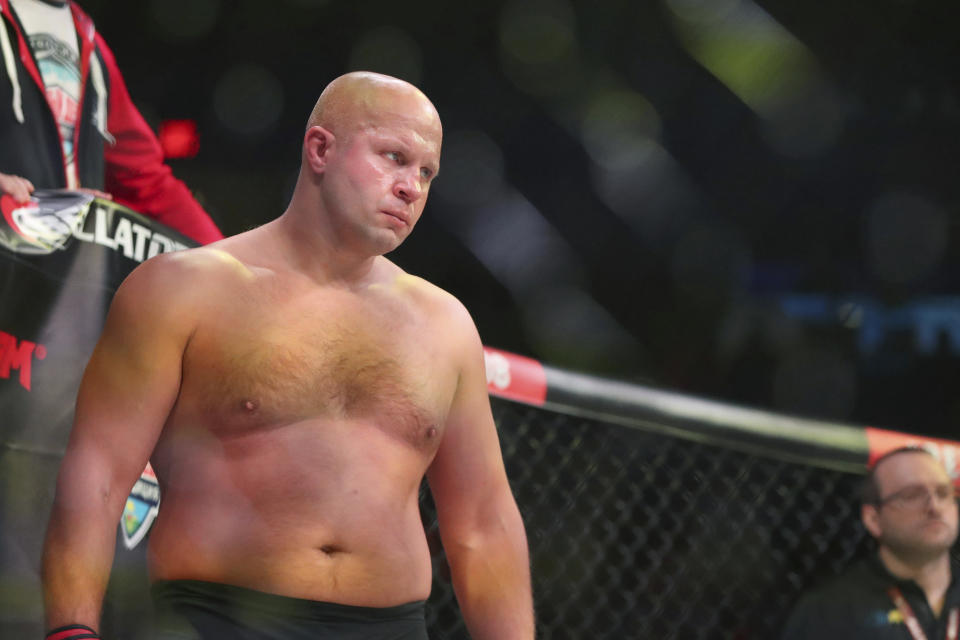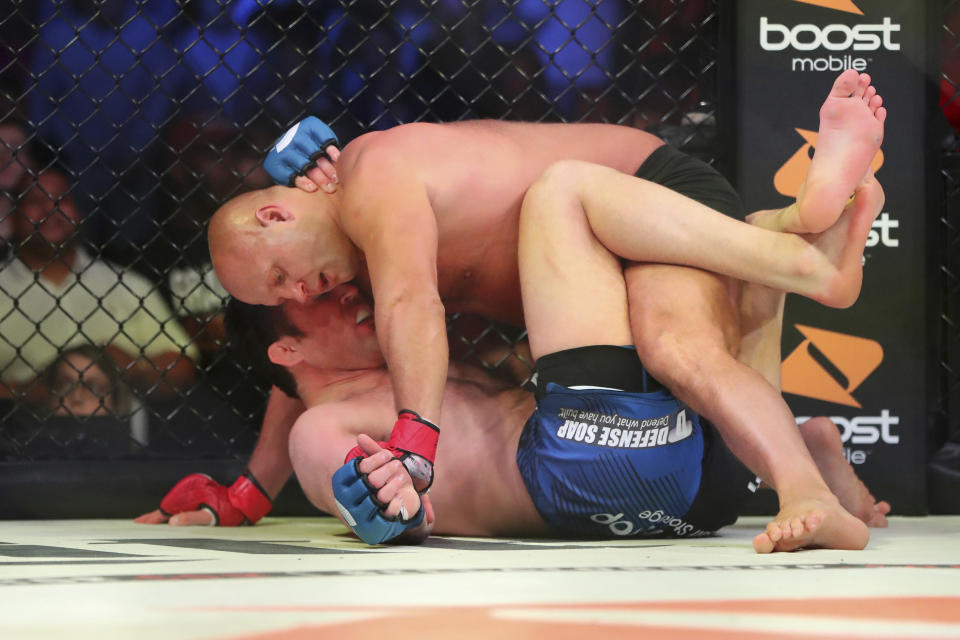Previously near-invincible, Fedor Emelianenko’s true greatness lies in his longevity

There are many who will tell you the story of Fedor Emelianenko lies in that four-year period from 2002 through 2006, when he was practically invincible while going against many of the greatest fighters of the era.
He fought 18 times in those five full years, an unusually high number for a fighter of his stature, and won 17 of them with one a no-contest. He finished 13 of those 17 bouts, and racked up wins over the likes of Antonio Rodrigo Nogueira, Kevin Randleman, Mark Coleman, Mirko “Cro Cop” Filipovic, Mark Hunt, Semmy Schilt and Heath Herring.
But Emelianenko’s true greatness lies in his longevity. On Saturday, 18 years and 8 months after his professional debut, he’ll stand across the cage from Ryan Bader at The Forum in Inglewood, California, for the Bellator Heavyweight Grand Prix championship.
Emelianenko is 42 now and not nearly the same fighter he was more than a decade ago when there was no finer mixed martial artist on the planet.
Emelianenko was one of the sport’s superstars in its first decade, yet has remained a factor as it is heading toward its third.
He’s 6-4-1 since 2010, but he’s beaten ex-UFC heavyweight champion Frank Mir and former UFC title challenger Chael Sonnen by TKO in his last two outings to make it to the finals of the Bellator tournament on Saturday.
Emelianenko has been able to adapt to the changing times in MMA better than some of his contemporaries in the early days of the sport like Royce Gracie and Ken Shamrock.
Gracie set a standard in the first several UFC shows by using his jiu-jitsu to blow through men much bigger and stronger. Gracie, though, dominated in an era where few fighters trained in all aspects and specialized in one. He used his jiu-jitsu successfully against opponents who had no idea how to defend against it. But as the sport evolved, Gracie didn’t adapt with it and that was shown in the brutal beating he received at the hands of Matt Hughes at UFC 60 on May 27, 2006.
Gracie is a decade older than Emelianenko, but he wasn’t able to incorporate other elements into his game to a degree that would allow him to be competitive against athletes who were versed in jiu-jitsu defense and had multiple elements to their game.
Emelianenko came into the sport as one of its first well-rounded fighters, and showed what was possible if a fighter could compete in all positions. The sport is much more enjoyable to watch when fighters are so well-rounded, and the fighters who have the ability to transition from one discipline to the other effortlessly are almost always the best.
Emelianenko inspired a generation of athletes to not only try the sport, but to become well-versed in all disciplines. Just like legendary Boston Bruins defenseman Bobby Orr changed the way hockey was played by using his speed to get involved in the attack offensively, Emelianenko changed MMA with his versatility. And while he’s no longer a superstar and is more than a 3-1 underdog against Bader, it’s enabled him to be competitive.

His greatness in the cage is difficult to assess because of the legends he hasn’t fought. Most notable among the fighters he missed is Randy Couture, who did everything but rent an airplane to fly a banner over Emelianenko’s house begging him for a fight.
Emelianenko’s team could not, or would not, deal with the UFC, and it meant that he didn’t take a number of fights which would have been terrific for the fans. A match with Brock Lesnar in 2009 or Cain Velasquez in 2010 come to mind.
Since 2010, Emelianenko has had a few soft touches, such as a long-faded Pedro Rizzo and Jaideep Singh, and he hasn’t beaten anyone in that 6-4-1 span who was in their prime and at the top of their game. But he’s been good enough that he remains relevant and there are only a handful of fighters who would be clearly favored to beat him even at this point.
The mythology that surrounds him is greater than the record, but he’s been a game-changer for most of MMA’s existence.
In fighting Bader, it’s not as if he’s fighting a young opponent on the way up. Bader is 35 and his best days are behind him, too, though Bader remains a world-class fighter.
If he scores the storybook upset and defeats Bader, it would be his most significant victory since knocking out Andrei Arlovski in 2009. It would be the perfect ending if he’d say goodbye while on top.
If, as the odds suggest, he loses, he’ll have a decision to make. My guess is that he’s too proud to end his career on a loss, and would hang around for at least one more fight, probably in Russia, to go out with a win.
No matter what he does, his name will always be spoken not only among the sport’s greatest fighters, but among those who changed the way the game was played.
More from Yahoo Sports:
• Paylor: Chiefs’ Reid facing biggest decision of his career
• Harassed NFL refs moved from hotel after bad call
• Wetzel: For St. Louis, this is a nightmare Super Bowl
• NFL prospect chooses Senior Bowl over child’s birth


